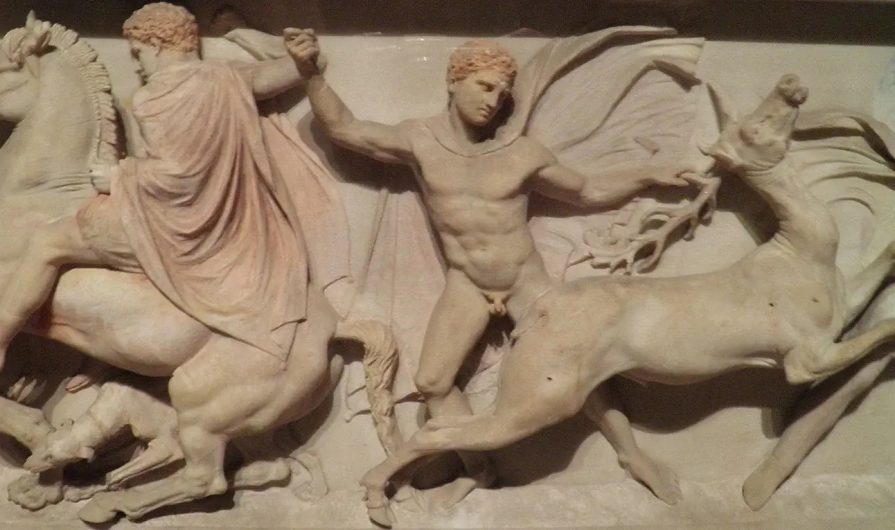He had studied under Aristotle, the greatest philosopher in Greece, and yet Kalanos, this strange old man from Taxila, an out of the way place that had made no mark upon the world, never ceased to confound him. No, Alexander could not fathom the gymnosophist’s indifference to wealth, to status, to custom, to all those things which, to him, were worth conquering others in order to obtain. And now this man was asking for his blessing to commit suicide by self-immolation—by fire.
‘It was a mistake coming with you,’ Kalanos explained. ‘You eat poorly, you travel around too much, and you have no respect for the true nature of things. This life you lead, it’s for the birds. But I am too old and too fragile to return to my homeland on my own, so, please, permit me this one gift, as I have refused so many others.’
But Alexander was ambivalent, because Kalanos had been a good friend. He did not want to lose him, to see him die after so little time together. Still, it was obvious he was not the same man that he’d been when they met, that though his mind was still sharp, his body had deteriorated like a rotting corpse. Kalanos could no longer perform his exercises, those strange contortions he would make—indeed, he could barely walk. And so Alexander granted him his wish. He ordered Ptolemy, his most trusted officer, to build a pyre, and when it was completed, he bade his friend goodbye.
‘Ah, but this is no goodbye,’ Kalanos replied, embracing the conqueror with his near naked body, clothed only in a wreath of flowers, ‘for I shall see you again in Babylon.’
Despite his greatness, Alexander did not possess the powers of Prometheus, and was unable to foresee that to which his friend was referring—his own impending doom. And how could he have, for at the time, he did not even have plans to go to Babylon! Instead, the king of Macedonia simply added the remark to the long list of things that Kalanos had said to him that made no sense. He thanked him for his companionship and wished him well in the afterlife.
And then he walked away, unable to stand by and watch the destruction: he did not want to have the image of his friend’s burning flesh forever singed into his memory. He traveled as far as it took to put the fire out of view, and then he waited. He was hoping that his absence might cause Kalanos to reconsider, make him realize just how much his life meant to the king, and when, several minutes later, Ptolemy came rushing up to his side, that was exactly what he thought had occurred. Instead, the officer informed him that the immolation was over, that the old man was dead.
‘Impossible!’ Alexander snapped. ‘Why did I not hear him scream?’
‘Because he went peacefully,’ Ptolemy reported. ‘He walked into the fire as if through a doorway into another world. His flesh burned and melted off his body, but he did not cry out in pain.’
But Alexander shook his head. ‘I don’t believe it. You are lying to me. What is this, some kind of trick? Did he put you up to this? Where is he? Take him to me now, or the pyre will yet get its use.’
‘I swear, my king,’ Ptolemy pleaded, backing off, ‘if you refuse to take my word for it, go and see for yourself.’
Which was exactly what Alexander did. He ran back to the pyre and stopped just shy of the flames. The heat was unbearable, but he bore it anyway, and squinted into the fire, only to discover Kalanos’ bones lying in a heap, blackened by death. Again, he thought of Aristotle, of his teachings about teleology, and wondered if this was what the great philosopher had meant.
That night, the king ordered a drinking contest in honor of Kalanos, and while his men downed cup after cup of the region’s finest unmixed wine, he, the great conqueror, contemplated his own vanity.
‘Everything that I have done,’ he muttered to no one, only to himself, ‘all that I have accomplished, bringing the known world under a single roof, naming city upon city after myself, and what is it compared to a man who can walk into raging fire without so much as a peep, and remain so, until he is no more? People say that I am a great man, but no, I am no man at all.’
But by dawn the next day, while Promachus, the winner of the contest, lay in bed, suffering from alcohol poisoning (he had but two more days before he would die), Alexander was back to his old self. In his sleep he had come to the conclusion that there were two kinds of greatness—the eternal kind, of which Kalanos was an exemplar, and the transient, of which there was no one greater than he. He loved life, clung to it as a mother clings to her newborn, and despite all the philosophy that he had learned over the years, he could not break that bond. No, it was his fate to rule, to conquer, to change the shape of the world as no other before him had, and perhaps no one after him would.
And still, he thought of his friend’s parting words, and in that moment decided that, yes, he would go to Babylon, and should the gods decree it, reunite with Kalanos there.


